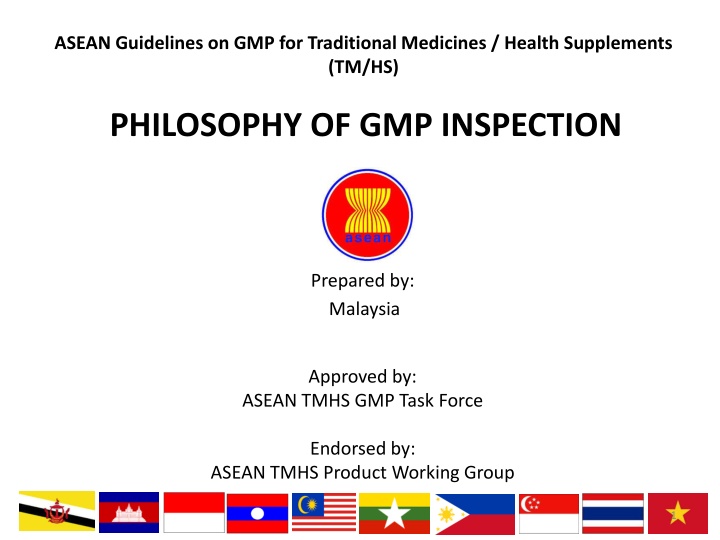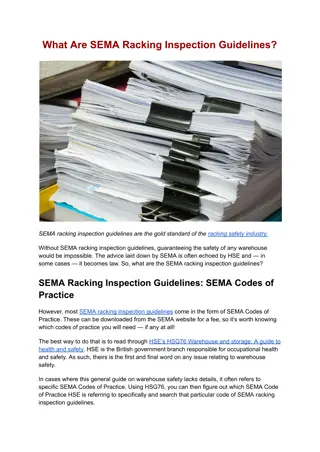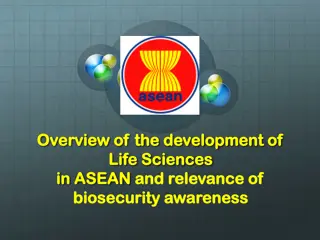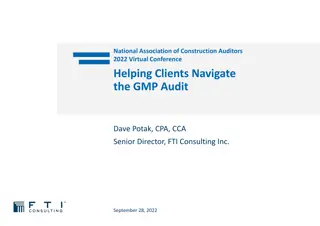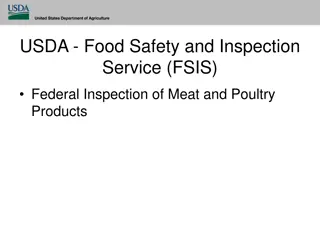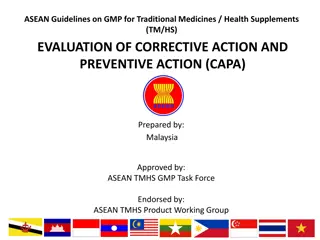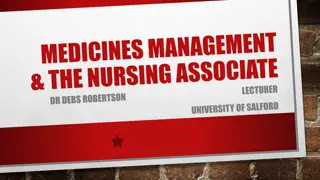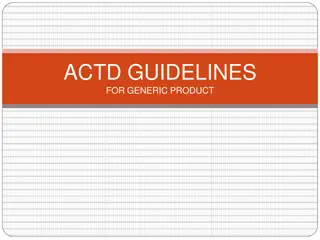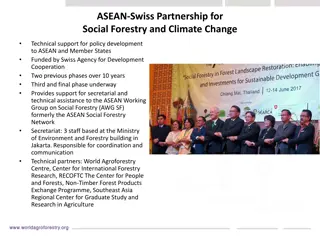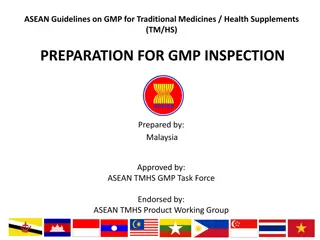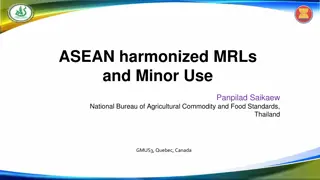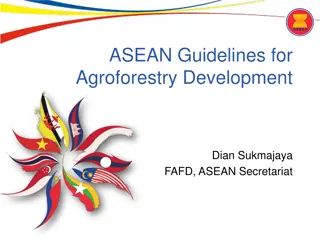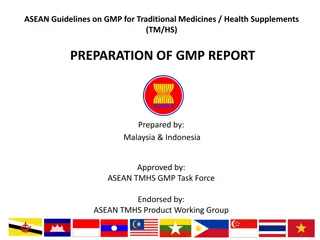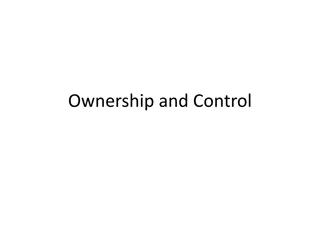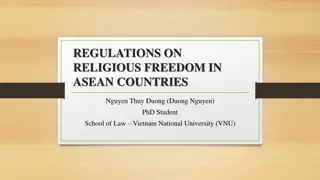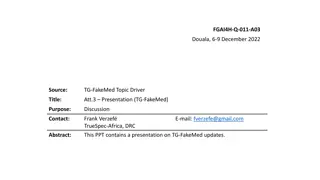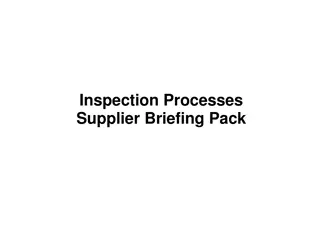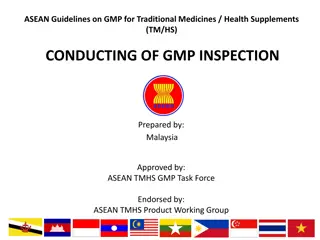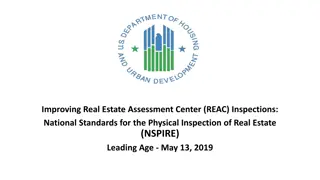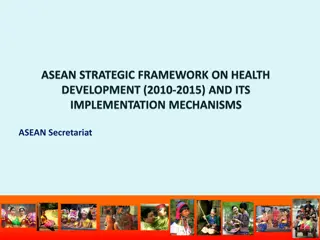ASEAN Guidelines on GMP for Traditional Medicines - Philosophy of Inspection
The ASEAN Guidelines on GMP for Traditional Medicines highlight the Philosophy of Inspection for ensuring quality and safety in traditional medicines and health supplements. The document covers legal terms, audit trail requirements, electronic signature control, and familiar auditor requirements. It emphasizes the importance of upholding rights, making informed decisions, and implementing secure electronic signature processes in the production and distribution of traditional medicines and health supplements.
Download Presentation

Please find below an Image/Link to download the presentation.
The content on the website is provided AS IS for your information and personal use only. It may not be sold, licensed, or shared on other websites without obtaining consent from the author.If you encounter any issues during the download, it is possible that the publisher has removed the file from their server.
You are allowed to download the files provided on this website for personal or commercial use, subject to the condition that they are used lawfully. All files are the property of their respective owners.
The content on the website is provided AS IS for your information and personal use only. It may not be sold, licensed, or shared on other websites without obtaining consent from the author.
E N D
Presentation Transcript
ASEAN Guidelines on GMP for Traditional Medicines / Health Supplements (TM/HS) PHILOSOPHY OF GMP INSPECTION Prepared by: Malaysia Approved by: ASEAN TMHS GMP Task Force Endorsed by: ASEAN TMHS Product Working Group 1
Legal Terms Right to be heard: No person shall be condemned, punished or have any property or legal right compromised by a court of law or authority action without having heard that person. Suspensive effective: The postponement of the execution of a decision pending the outcome of an appeal. 2 ASEAN Guidelines on GMP for Traditional Medicines / Health Supplements - 2015 Philosophy of Inspection
Legal Terms Decision: A judgment, decree, or determination of findings of fact and/or of law by a judge, arbitrator, court, governmental agency, or other official court. Advance notice: Informs the addressee about the decision that will be taken to guarantee the addressee s right to be heard. ASEAN Guidelines on GMP for Traditional Medicines / Health Supplements - 2015 Philosophy of Inspection
Most auditors would be familiar with the following requirements: Audit trails Backup (if applicable) Archiving Disaster Recovery ASEAN Guidelines on GMP for Traditional Medicines / Health Supplements - 2015 Philosophy of Inspection
Where electronic signatures are required, the following must be controlled : Authorized user log-on for a specific application A unique password called for the CS, linked to the authorized account for a specific application Permitted task functionality for that user Common time and standard referencing and transaction linking Time stamped audit trail System information security ASEAN Guidelines on GMP for Traditional Medicines / Health Supplements - 2015 Philosophy of Inspection
Audit trail requirements: The system should record the identity of operators entering or confirming critical data. Any alteration to an entry of critical data should be authorized and recorded with the reason for the change. Consideration should be given to building into the system the creation of a complete record of all entries and amendments (an audit trail ). ASEAN Guidelines on GMP for Traditional Medicines / Health Supplements - 2015 Philosophy of Inspection
Audit trail requirements: Any alteration made to the entry on a document should be signed and dated. The alteration should permit the reading of the original information. Where appropriate, the reason for the alteration should be recorded. ASEAN Guidelines on GMP for Traditional Medicines / Health Supplements - 2015 Philosophy of Inspection
Audit trails function: To independently record: the date and time of operator entries creations, modifications, or deletions of electronic records to verify that record changes do not obscure previously recorded information. ASEAN Guidelines on GMP for Traditional Medicines / Health Supplements - 2015 Philosophy of Inspection
Audit trail must be: Secured System generated Immutable Time stamped ASEAN Guidelines on GMP for Traditional Medicines / Health Supplements - 2015 Philosophy of Inspection
The Attributes of an Inspector Remember that in an AUDITTING . Unlimited number of possible scenarios Is a systematic approach Involves interpersonal skills Identifies deficiencies Look at what went wrong Requires participation from both parties Good Inspection Skills ASEAN Guidelines on GMP for Traditional Medicines / Health Supplements - 2015 Philosophy of Inspection
The Attributes of an Inspector We must respect the codes of ethics and conduct; Keep objectivity, impartiality, confidentiality Mandatory good diplomat Quality System mandatory for all inspectorates ? ASEAN Guidelines on GMP for Traditional Medicines / Health Supplements - 2015 Philosophy of Inspection
The Attributes of an Inspector PI 002-3 25 September 2007 RECOMMENDATION ON QUALITY SYSTEM REQUIREMENTS FOR PHARMACEUTICAL INSPECTORATES 3. PURPOSE The purpose of adopting a common standard of inspection is to achieve consistency in auditing standards between auditors and thus to Facilitate mutual recognition and AUDITORS / INSPECTORATES confidence between ASEAN Guidelines on GMP for Traditional Medicines / Health Supplements - 2015 Philosophy of Inspection
The Attributes of an Inspector PI 002-3 25 September 2007 RECOMMENDATION ON QUALITY SYSTEM REQUIREMENTS FOR PHARMACEUTICAL INSPECTORATES The personnel of the auditing service, should be free from any commercial, financial and other pressures which might affect their judgment and freedom to act. Auditor should ensure organizations external to the audited organization cannot influence the result of the audit. Rules for deontology, ethics, conflict of interest and improper influence should be clearly defined. that the persons or ASEAN Guidelines on GMP for Traditional Medicines / Health Supplements - 2015 Philosophy of Inspection
The Attributes of an Inspector PI 002-3 25 September 2007 RECOMMENDATION ON QUALITY SYSTEM REQUIREMENTS FOR PHARMACEUTICAL INSPECTORATES When more than one auditor is involved in an audit, a lead inspector should be appointed to coordinate audit activities. The audit report should normally be prepared by the lead auditor and should be agreed by all participating auditors. Observations and/or data obtained in the course of the audit should be recorded in a timely manner to prevent loss of relevant information. ASEAN Guidelines on GMP for Traditional Medicines / Health Supplements - 2015 Philosophy of Inspection
The Attributes of an Inspector Technical Aspects The auditor should have the skill to make professional judgments based on Facts and Science as to the conformity of the audited party with the requirements of good practices and the relevant legislation / guidelines and be able to make an appropriate risk assessment. ASEAN Guidelines on GMP for Traditional Medicines / Health Supplements - 2015 Philosophy of Inspection
The Attributes of an Inspector Technical & Non technical Aspects The credibility of a auditing process will depend to a large degree on the technical competence and integrity of the auditor but The non-technical skills are equally important to the final outcome. ASEAN Guidelines on GMP for Traditional Medicines / Health Supplements - 2015 Philosophy of Inspection
The Attributes of an Inspector Non-technical Aspects Clothing Dress accordingly & Taking in account the country codes Note: Important for women inspectors, given the variability of custom clothing ASEAN Guidelines on GMP for Traditional Medicines / Health Supplements - 2015 Philosophy of Inspection
The Attributes of an Inspector Non-technical Aspects Remember that as an inspector, we are obliged to PREPARE how you will introduce yourself, the interview & its purpose ASSESS already available info SPECIFY interview objective Preparation Flexibility & Set limits Objectivity Positive attitude Integrity Always do your homework: Perfect Preparation Prevent Poor Performance Coherence Good Organization Skills ASEAN Guidelines on GMP for Traditional Medicines / Health Supplements - 2015 Philosophy of Inspection
The Attributes of an Inspector Non-technical Aspects Good Communication Skills Language Body language Personality, Emotions, Culture Note: Personality as a dynamic and organized set of characteristics possessed by a person that uniquely influences his or her cognitions, motivations, and behaviors in various situations. The word personality originates from Latin persona, which means mask. ASEAN Guidelines on GMP for Traditional Medicines / Health Supplements - 2015 Philosophy of Inspection
The Attributes of an Inspector Non-technical Aspects Remember that we are obliged to . PLANNING AHEAD Good Time Management Define objectives Set priorities Detect weaknesses Detect inconsistencies Check traceability Manage bad conduct & conflicts Manage people/processes Creating links Manage the situation / process / Manage time ASEAN Guidelines on GMP for Traditional Medicines / Health Supplements - 2015 Philosophy of Inspection
The Attributes of an Inspector Non-technical Aspects An audit process requires participation from both parties with questions followed by answers that frequently, the response will lead to the next question, so we must be a good listener ASEAN Guidelines on GMP for Traditional Medicines / Health Supplements - 2015 Philosophy of Inspection
The Attributes of an Inspector Non-technical Aspects A positive atmosphere makes inspections much more easier for both parties ASEAN Guidelines on GMP for Traditional Medicines / Health Supplements - 2015 Philosophy of Inspection
The Attributes of an Inspector Non-technical Aspects Asking Questions . Open questions stating with: How? Where? Who? What? Why? When? Good questioning skills Silence can be very powerful ASEAN Guidelines on GMP for Traditional Medicines / Health Supplements - 2015 Philosophy of Inspection
The Attributes of an Inspector Non-technical Aspects Good listening practices Active listening & avoid misunderstanding or Passive listening and paying attention Hear the person out & be patient Show the person that you are listening & interested Encourage the person to continue e.g. by facing the person repeat important information with your own words wait for the confirmation Be approachable Try to understand the speaker s points of view ASEAN Guidelines on GMP for Traditional Medicines / Health Supplements - 2015 Philosophy of Inspection
The Attributes of an Inspector Non-technical Aspects At Meeting Do Not Include: Subjective opinions Irrelevant information Ambiguous statement Antagonistic statement New deficiencies which are not previously discussed! Transparency ASEAN Guidelines on GMP for Traditional Medicines / Health Supplements - 2015 Philosophy of Inspection
The Attributes of an Inspector Non-technical Aspects At Meeting: Good communication & interpersonal skills Inspector must lead Concise presentation Discussion Know when to invite discussion and when to limit the discussion Mention good points before deficiencies Treat challenges politely Discuss and resolve conflicts Admit if wrong Don t back down if convinced you are right ASEAN Guidelines on GMP for Traditional Medicines / Health Supplements - 2015 Philosophy of Inspection
The Attributes of an Inspector Non-technical Aspects Should be aware of the auditor s influence Careful interfering in well coordinated process / systems Avoid entering the role of a consultant Tell what is wrong Why it is wrong But not how to change! ASEAN Guidelines on GMP for Traditional Medicines / Health Supplements - 2015 Philosophy of Inspection
The Attributes of an Inspector Non-technical Aspects Disclosure of faults, deficiencies, discrepancies How to say it How to find the key to the understanding of the other party Good Interpersonal skills ASEAN Guidelines on GMP for Traditional Medicines / Health Supplements - 2015 Philosophy of Inspection
The Attributes of an Inspector Non-technical Aspects Avoid & Control Bad predisposition & Prejudgment Underestimate the auditee Excessively emotional Hubris, Arrogance & Truculence Inexperience Bad preparation of inspection Interest conflicts Personal interpretation of guidelines Negligence; opportunist; Narcissism ASEAN Guidelines on GMP for Traditional Medicines / Health Supplements - 2015 Philosophy of Inspection
Approaching the Interview What is the objective or purpose of the inspection? What do I know? What do I want to know? What are the element of the concern? What is the background of the company/interviewee? ASEAN Guidelines on GMP for Traditional Medicines / Health Supplements - 2015 Philosophy of Inspection
Skills and Attributes of the Inspector Relevant training and knowledge on the requirements and technical processes for the specific inspection. Demonstrate the 4 P s Polite Prepared Professional Patient ASEAN Guidelines on GMP for Traditional Medicines / Health Supplements - 2015 Philosophy of Inspection
Dos and Donts of Questioning Don t Intimidate, interrogate or thick Embarrass interviewees Answer your own questions Ask more than one question at a time Ask too many question with a yes or no answer Get sidetracked by answers Say you understand if you don t ASEAN Guidelines on GMP for Traditional Medicines / Health Supplements - 2015 Philosophy of Inspection
Dos and Donts of Questioning Do Interview and involve the right audience Set a theme before posing questions Include one main thought in each question State questions clearly, concisely and audibly Ask questions in a friendly and natural way Use questions carefully and time them appropriately ASEAN Guidelines on GMP for Traditional Medicines / Health Supplements - 2015 Philosophy of Inspection
Open-ended Questions Require factual, detailed responses by the interviewee. Creates a dialog between the inspector and the interviewee and answers are able to indicate whether the interviewee questions. Generally, one open-ended question will lead to another through the dialog process. Typically begin with : what, why, when, where, who & how understood the ASEAN Guidelines on GMP for Traditional Medicines / Health Supplements - 2015 Philosophy of Inspection
Open-ended Questions Types of open-ended questions include: Themed questions Expansive questions Investigative questions Opinion questions Repetitive questions Hypothetical questions ASEAN Guidelines on GMP for Traditional Medicines / Health Supplements - 2015 Philosophy of Inspection
Remember to Put interviewee at ease prior to the interview Be tactful and polite Reflect the right attitude and tone of voice Use paraphrasing where necessary Watch body language and facial expressions Smile and show eye contact Listen actively and show interest in the interviewee Show patience and understanding Turn off your own problems Avoid off-the-cuff or condescending remarks Give praise when appropriate Say please and thank you ASEAN Guidelines on GMP for Traditional Medicines / Health Supplements - 2015 Philosophy of Inspection
Types of Open-ended Questions Themed questions: requires setting a theme before posing a question, e.g. : Talking of software validation, how do you ? Expansive questions: expands the conversation and also creates a high level of empathy because they show that the inspector is interested in interviewee s responses. Can often clear up vague areas as well as clarify the inspector s perceptions, e.g. : How important is it for you to be advised of this type of procedure? ; What areas are you thinking of? ; Why do you feel there is a need for ? ASEAN Guidelines on GMP for Traditional Medicines / Health Supplements - 2015 Philosophy of Inspection
Types of Open-ended Questions Investigative questions: have an investigative role and also useful when the inspector is not sure whether the interviewee has fully understood a question but avoids making it obvious, e.g.: Can you tell me why this unit marked with a red tag is on the pallet of finished goods tested? Opinion question: useful for gaining someone s attention and confidence or for gaining new approaches to solving a problem. Also indicates that the inspector regards the interviewee view as important and encourages them to say more, e.g.: What do you think would be the most effective ?; How would you go about ? ASEAN Guidelines on GMP for Traditional Medicines / Health Supplements - 2015 Philosophy of Inspection
Types of Open-ended Questions Repetitive questions: questions that may need to be repeated or paraphrased for the purpose of eliciting more information but overuse of repetitive questions should be avoid. Hypothetical questions: should also be used with care but can be a good way of gauging priorities and contingency planning. e.g. : Suppose the power failed? , What if no calculations satisfied this equation? ASEAN Guidelines on GMP for Traditional Medicines / Health Supplements - 2015 Philosophy of Inspection
Types of Open-ended Questions Probing questions: Having stimulated the interviewee to talk, the inspector may wish to pursue a particular point further. Probing questions allow a focus on a point of interest and yield more information. Usually also contain: what, why, when, where, who & how. e.g. : Tell me more about how ? ASEAN Guidelines on GMP for Traditional Medicines / Health Supplements - 2015 Philosophy of Inspection
Closed Questions Require a simple yes or no from the interviewee. It does not allow you to judge if the question was fully understood. Does not promote a dialog and requires that the inspector follow up with further questions. Forces the auditor to do all of the work. Types of closed questions include: Assumptive questions Leading questions Loaded questions ASEAN Guidelines on GMP for Traditional Medicines / Health Supplements - 2015 Philosophy of Inspection
Types of Closed Questions Assumptive Questions: these questions are formulated based on assumptions and directed in such a way that a straight answer needs the person answering to adhere to the inspector s assumption. E.g., How often do you do that? (assumes that it s done at least sometimes) Leading Questions: These questions point the interviewee in the direction of the answer and are best avoided. The may be of use sometimes to secure the commitment of the interviewee to a preferred line of action. E.g., So you will go ahead with this corrective action and report back within two weeks? In this way, the inspector leads the question to an obvious answer but may also get the commitment of the interviewee to take the corrective action. ASEAN Guidelines on GMP for Traditional Medicines / Health Supplements - 2015 Philosophy of Inspection
Types of Closed Questions Loaded Questions: this type of question puts the interviewee in a losing situation. For example: Have you stopped deviating from GMP? if the answer is yes , the person is obviously a GMP violator, although a reformed one. If the answer is no then the person is an uninformed GMP violator. responsible person who does comply with GMP. There is no answer for a ASEAN Guidelines on GMP for Traditional Medicines / Health Supplements - 2015 Philosophy of Inspection
Combination Questions Also called Clarifying Questions: are a combination of open and close questions and may be used to obtain more information on a specific subject, or to eliminate ambiguity. These questions can also be reassuring to the interviewee as it demonstrates that the inspector has been listening carefully and observing what has been said accurately. E.g. : Can you explain what you mean by that? ASEAN Guidelines on GMP for Traditional Medicines / Health Supplements - 2015 Philosophy of Inspection
Non-Verbal Techniques Silence: This is the secret weapon in the inspector s armory as most people are very uncomfortable with silence. If the response to an open-ended question leaves the inspector with a strong impression that there is more to come, it is worth remaining silent for a while. Almost invariably the interviewee becomes uncomfortable and start talking again. This technique has to be handled with care and used only when the inspector is fairly confident that there is more information to come or it may create insecurity and anxiety on the part of the interviewee. ASEAN Guidelines on GMP for Traditional Medicines / Health Supplements - 2015 Philosophy of Inspection
Non-Verbal Techniques Non-verbal questioning: For example, raising of the eyebrows while maintaining eye contact can indicate a wish for the interviewee to continue with his response or to confirm what has been said. Also, simply looking at the interviewee in an expectant manner following a response often encourages him to carry on talking without verbal interruption. Such a technique must be used with care to avoid the appearance of an interrogation. ASEAN Guidelines on GMP for Traditional Medicines / Health Supplements - 2015 Philosophy of Inspection
Non-Verbal Techniques Tone and Emphasis: Often a different meaning can be conveyed by a question simply by altering the tone and emphasis of its delivery. E.g., Who authorized THAT? a simple request for information. It can become: Who authorized THAT? meaning who in their right mind would authorize that load of rubbish? Or: WHO authorized that? meaning (s)he hasn t the authority to do that. Or even: WHO authorized THAT? ASEAN Guidelines on GMP for Traditional Medicines / Health Supplements - 2015 Philosophy of Inspection
PHILOSOPHY OF GMP INSPECTION POWER & INFLUENCING STYLES, HANDLING DIFFICULT BEHAVIOR, ELICITING OPTIMAL RESPONSES ASEAN Guidelines on GMP for Traditional Medicines / Health Supplements - 2015 Philosophy of Inspection
Power & Influencing Styles You are in control of the inspection not the organisation. How do you demonstrate this? Walk of Grace and Power: From the car to Reception From Reception to the Meeting Room Entering the Meeting Room ASEAN Guidelines on GMP for Traditional Medicines / Health Supplements - 2015 Philosophy of Inspection
Power & Influencing Styles You are in control of the auditing not the company. Speak at 100 words per minute. This will recognized sub-consciously that you are delivering a serious message. State clearly at the beginning that any company presentations must be short and directly relevant to the inspection. Be prepared to interrupt politely if the company tries to waste time with irrelevant company history or sales figures. ASEAN Guidelines on GMP for Traditional Medicines / Health Supplements - 2015 Philosophy of Inspection
